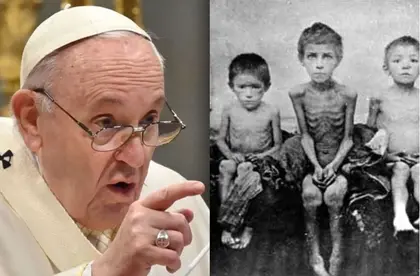On the day dedicated to the memory of the 1932-1933 Holodomor in Ukraine – which falls annually on the fourth Friday in November – Pope Francis mentioned the famine in Ukraine with the words: “the extermination by hunger… caused artificially by Stalin”. In the same speech, he invited prayers both for the victims of that “genocide” and for “the many Ukrainians, children, women and the elderly who today suffer the martyrdom of aggression.”
The Pope’s words mark a turning point in the pontiff’s position towards the Russian invasion of Ukraine. In recent months, the head of the Catholic Church and most influential leader of Christianity had held an ambiguous position, seeking a sort of moral equivalence between the aggressor and the attacked.
Just weeks earlier, Ukrainian diplomats had reacted with indignation to the Pope’s mention of the murder of the Russian reporter Daria Dugina as a victim of the war, implicitly accepting the thesis of Ukraine’s responsibility in the bomb attack that killed her.
Today, the Pope’s position has changed, which one can consider through the formalization of two theses.
First, the Pope branded the 1930s famine in Ukraine, triggered by Joseph Stalin’s policies, as “genocide.”
Concerning this tragedy, which led to between four and five million deaths, historians have struggled for decades to arrive at a unanimous historical truth. Instead, the political class of Western countries avoided taking a stand, following the theory that they were necessary victims of the class struggle in the Soviet Union, to eradicate the “privatistic” mentality of the peasants in Ukraine and the “autonomistic” temptations of the Ukrainian communists.
This resistance to the historic condemnation of that massacre also stemmed from the opportunity to maintain good relations with Russia – avoiding irritating the Russians with this accusation. It is the same reason why many countries do not want to condemn the massacre of the Armenians so as not to make enemies of Turkey.
From this point of view, the decision of the German Parliament to vote to condemn the Holodomor as genocide – an initiative still unthinkable before Feb. 24 – is a sensation.
The second thesis is that of a clear comparison between the Holodomor and the on-going Russian invasion.
In practice, Stalin’s behavior is put on the same level as Putin’s. In a public “letter to the Ukrainian people,” Pope Francis said he was “admired” by the “good ardor” of that “bold and strong people, a people who suffer and pray, weep and fight, resist and hope… a noble and martyr people.”
From this perspective, the recent public release of Dmitriy Peskov, of the press office of the Russian president, who has shown himself to be in favor of peace mediation by Pope Francis, seems paradoxical. Considering that a Catholic Pope has never been welcome in Moscow due to rivalry with the Orthodox Church, it seems that the Kremlin is clinging to any chance to get out of the war.
The views expressed are the author’s and not necessarily of Kyiv Post.
You can also highlight the text and press Ctrl + Enter



